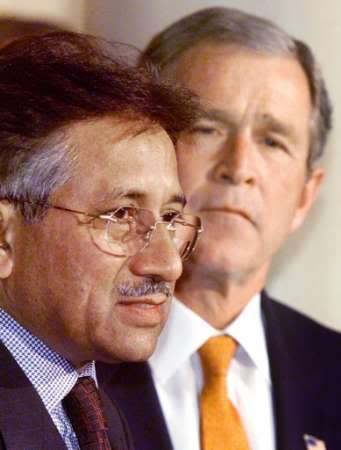An Ally Becomes Unsupportable
 Gen. Pervez Musharraf has come to the long-dreaded point where he has decided to emphasize "general" over "president," suspending democracy and Pakistan's constitution, since it has become increasingly apparent that the country's Supreme Court would find his recent re-election unconstitutional.
Gen. Pervez Musharraf has come to the long-dreaded point where he has decided to emphasize "general" over "president," suspending democracy and Pakistan's constitution, since it has become increasingly apparent that the country's Supreme Court would find his recent re-election unconstitutional.Here's the NYT story; here's the Captain's excellent digest of the event.
State has been wagging its finger at Musharraf for months, telling him such an action would mean a suspension of military aid, and coordinating the return of Benazir Bhutto to Pakistan in the hopes that she might shore up democratic rule. Musharraf opted for the little man in abig uniform rule instead.
So what's a democracy-boosting nation like America to do in a situation like this? And more to the point, what are Pakistan's near neighbor, democracy-dreading nations -- China and Russia -- to do? If we do suspend aid, they will happily fill the void.
If we don't, our efforts to support democracies in the face of Islamist dictatorships will suffer a setback. But also if we don't, our efforts to take out the Taliban may suffer as well.
Of course, we owe nothing to a military dictatorship in Islamabad, so the turn of events may actually allow us to be more aggressive in attacks on the Islamist strongholds on the Pakistani frontier. But that would likely drive the Pakistanis to the Russians and Chinese all the quicker.
Oh, the complex games of foreign policy!
Our interests appear to be in the hands of Musharraf's generals. Have our military attaches and liaison officers built relations strong enough to encourage them to turn against Musharraf and hand the nation back to the people? I certainly don't know, and it appears to be a long, long shot, but my dad was an assistant military attache in both Turkey and Japan, and I know a bit about how deep those relationships can be -- so there is at least a dim hope.
The members of the Pakistani Supreme Court now sit in their homes, their telephones cut off, their exits surrounded by military personnel. It is an apt image for the hopes of those Pakistanis who shun both military and Islamist dictatorships -- captured where they don't want to be, shut off, surrounded.
Labels: Foreign policy, Pakistan, War on Terror




<< Home